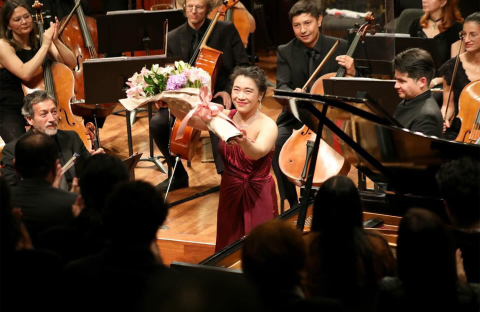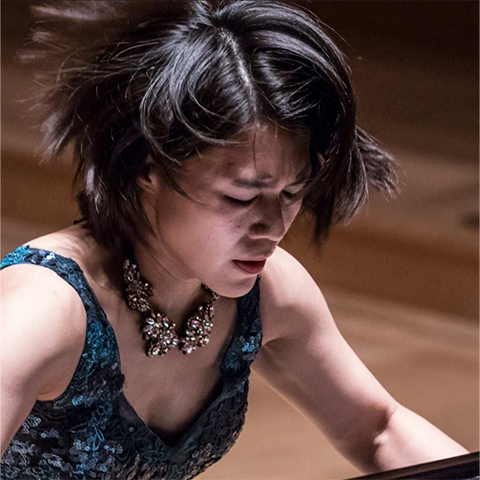Q&A with Piano Faculty Member Charlotte Hu

Charlotte Hu in performance with Orquesta Filarmónica de Bogotá
Kike Barona
Boston Conservatory at Berklee welcomed Charlotte Hu to its Piano Department faculty in January 2025. Hu’s magnetic stage presence and deeply expressive interpretations of repertoire have made her an in-demand soloist over the past two decades, with performances at Lincoln Center, Carnegie Hall, Wigmore Hall, the Concertgebouw, and Osaka’s Symphony Hall. Also a committed educator—and firm believer in making classical music accessible to all—she founded piano festivals on two continents: the Yun-Hsiang International Music Festival in her native Taipei and the Philadelphia Young Pianists’ Academy.
Hu’s many accolades include the top prize in the Arthur Rubinstein International Piano Competition and the Concert Artists Guild Competition. In this Q&A, she shares her approach to preparing for high-stakes performances, the importance of mentorship, and the key to a productive student-teacher relationship.

What made you want to become a classical musician? And what keeps you engaged today, many years into your career?
My journey into classical music began with a passion for performing. I started playing the piano at age 5 and decided to pursue a career as a concert pianist around age 9 or 10, after attending a concert by cellist Mstislav Rostropovich in my native Taipei. I was captivated by the collaboration between him and his pianist and the beauty of their performance. As a child, I loved all aspects of the performing arts (piano, acting, singing, and I also played the oboe for several years in an orchestra), which led me to come to the US to study at Juilliard at age 14.
These days, my passion lies in exploring new projects and collaborations. I marvel at how classical music and artistry grow richer with age and life experiences. Continuous learning and the joy of performing and connecting with audiences fuel my enthusiasm.
What qualities set a great musician apart from a good musician? And, by extension, what qualities can turn a great musician into a great performer?
A remarkable musician distinguishes themselves by expressing profound emotions and artistry, always seeking a higher truth and the divine. In contrast, an exceptional performer captivates the audience, leading them through an engaging experience. They excel in their craft, guiding you through the music like a skilled actor, making the experience both personal and convincing. This is all supported by a strong foundation of technique, nuances, stage presence, and more, which make the performance appear effortless.
How do you approach teaching private lessons? In your experience, what creates a productive bond between teachers and students?
My teaching philosophy focuses on recognizing each student’s individuality in both life and music, and uncovering their distinct qualities. I guide them in developing their artistry and craft by identifying their strengths and areas for improvement. Teaching is about finding the raw diamonds and allowing their uniqueness to shine. It’s a deeply personal process and a collaborative effort between teacher and student, built on trust, communication, and faith. This partnership can have a profound impact on a young person’s life.
You have an impressive track record in competition, having won the Arthur Rubinstein International Piano Competition and the Concert Artists Guild Competition at a young age. How would you go about preparing for competitions or, these days, for important concerts?
Preparation is key. You need a mentor who knows you well and can help you choose the right competitions. Together, you plan a repertoire that showcases your best strengths. Then, you refine it through time and live performances, a strategy I call the “microwave” approach. Reheating food multiple times can draw out more complex flavors in dishes. Similarly in music, we revisit and refine pieces multiple times over an extended period, each “reheating” bringing out new layers of musical complexity and interpretation.
Once you have lived with your repertoire, you can take it to competitions. For important concerts nowadays, I plan my seasons well in advance, building programs that bring special meanings to me and working backward to ensure I have ample time to live with them.
What is the most common misconception students have about practicing?
Students often believe that more practice time leads to better results. However, effective practice requires focus, mindfulness, and goal-orientation, not just the quantity of time spent. You must know what you want to achieve before sitting down in front of your instrument.
Outside of piano playing, what activities or daily practices do you believe can enhance musicianship? What additional skills do you think young musicians should acquire before they leave school?
I’ve been meditating since I was 9, and it has provided me with the focus and clarity essential for performing on stage, especially under pressure. Young musicians should also cultivate self-discipline, time management, and business acumen to navigate the professional world. Through founding and directing two festivals and non-profits, like the Philadelphia Young Pianists’ Academy, I’ve learned tremendously about entrepreneurship, marketing, and social media first hand, which are crucial for young artists today.
What is your favorite repertoire to play, and what do you love about it?
It changes over time. I’m drawn to repertoire with spontaneity, nuances, and emotional depth. I recently released a Franz Liszt album with Pentatone called Liszt Metamorphosis, and focused on his works for a while, having previously explored Rachmaninoff. This season, I’m focusing on French and Spanish impressionism, including works by Debussy, Ravel, and Albeniz. I’m also preparing for my next album, featuring works by Granados, to be released in spring 2026. When it comes to music, I always find inspiration in the works of Mozart.
